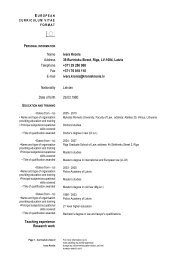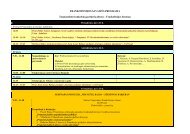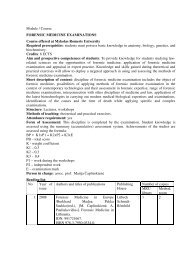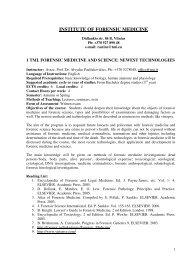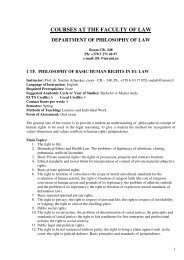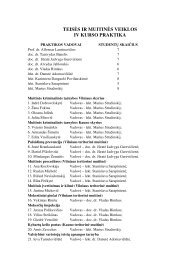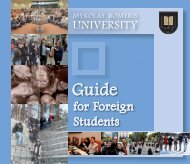Name of Lecturer: Prof. dr. Saulius Arlauskas tfk@mruni.lt
Name of Lecturer: Prof. dr. Saulius Arlauskas tfk@mruni.lt
Name of Lecturer: Prof. dr. Saulius Arlauskas tfk@mruni.lt
Create successful ePaper yourself
Turn your PDF publications into a flip-book with our unique Google optimized e-Paper software.
Law on Financial Instruments and their Market<br />
<strong>Name</strong> <strong>of</strong> <strong>Lecturer</strong>: doc. Tomas Talutis, tel: +370 5 27 14 525, ttalutis@mruni.eu<br />
Facu<strong>lt</strong>y: Law Facu<strong>lt</strong>y<br />
Department, Contact Details: Business Law Department, Ateities g. 20 Vilnius,<br />
Room V-355, Tel.: (00370 5) 271 4525, E-mail: vrtk@mruni.eu<br />
Language <strong>of</strong> instruction: English<br />
Level <strong>of</strong> Course Unit: Bachelor degree studies (from 3rd year <strong>of</strong> studies) or Master<br />
degree studies<br />
Year <strong>of</strong> Study (if applicable): n/a<br />
Required prerequisites: Civil Law, Commercial Law<br />
Learning Outcomes <strong>of</strong> the Course Unit 1 : Students will be introduced into the<br />
regulation <strong>of</strong> financial instruments and capital market. Student will be able to<br />
understand the functioning <strong>of</strong> the capital market and to analyse the regulation there<strong>of</strong>.<br />
ECTS credits: 6<br />
Contact hours per week: 3<br />
Semester: Autumn<br />
Planned Learning Activities and Teaching Methods: Lectures, individual studies<br />
Assessment methods and Criteria: Written exam: test (20 questions). Exam – 80 %<br />
<strong>of</strong> final grade, class work – 20 %.<br />
Course content:<br />
The course consists <strong>of</strong> 7 main parts: 1) Financial instruments, their types, transactions<br />
in financial instruments; 2) Regulation <strong>of</strong> the activity <strong>of</strong> commercial banks; 3)<br />
Investment activities and providing <strong>of</strong> investment services; 4) Regulation <strong>of</strong> the<br />
public circulation <strong>of</strong> financial instruments; 5) Regulation <strong>of</strong> collective investment<br />
undertakings and pension accumulation activities; 6) Protection <strong>of</strong> clients’ interests on<br />
market in financial instruments; 7) State supervision <strong>of</strong> the market in financial<br />
instruments.<br />
Reading list:<br />
18. A Practitioner‘s Guide to EU Financial Services Directives. Consu<strong>lt</strong>ant Editor M.<br />
Raffan. 2 nd ed. Old Woking, 2006.<br />
19. A Practitioner‘s Guide to MiFID. 1 st ed. Old Woking, 2007.<br />
20. A Practitioner‘s Guide to Takeovers and Mergers in the European Union. 4 th ed.<br />
Old Woking, 2005.<br />
21. Financial Services Law. Edited by M. Blair, G. Walker. Oxford, 2006.<br />
22. Wood Ph. Law and Practice <strong>of</strong> International Finance. London, 2008.<br />
1 Knowledge, skills, competences that students can demonstrate/acquires during the course<br />
50



